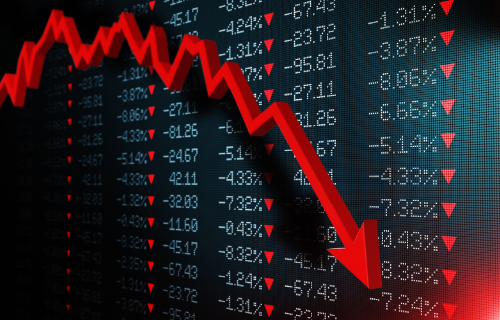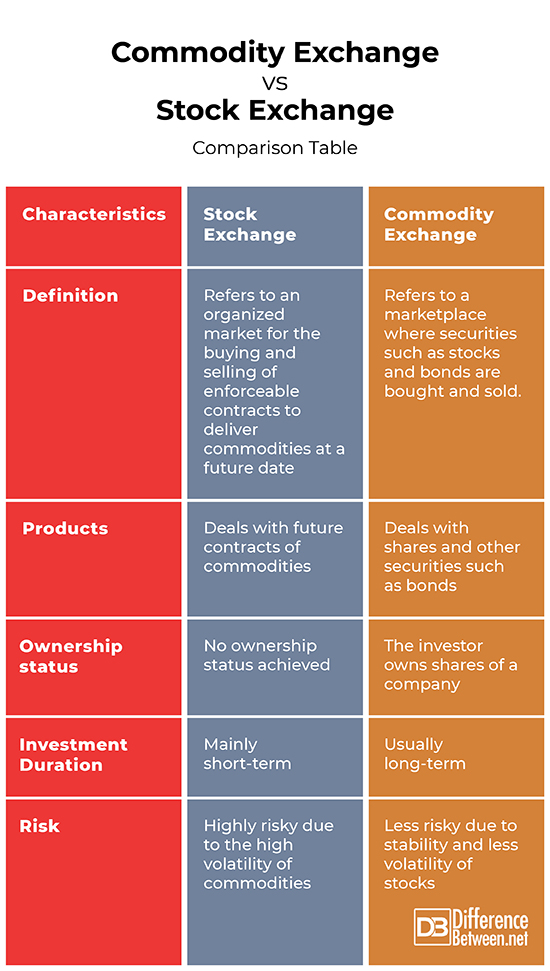Difference Between Commodity Exchange and Stock Exchange
The terms commodity and stock are commonly used when describing investments in the stock market. Although the two are traded on open exchanges every day, they are two different types of investments. In this article, let’s find out the differences between commodity exchange and stock exchange.

Commodity Exchange
Commodity exchange refers to an organized market for the buying and selling of enforceable contracts to deliver commodities. These commodities include wheat, gold, crude oil, or financial instruments like the Eurodollar. These contracts are known as futures and are bought and sold through an auction that is competitive on the commodity exchange.
Thus, commodity exchange is also referred to as Future’s market or Future’s exchange.
Options and indexes, which are financial instruments, are also traded on commodity exchanges.
A commodity exchange also refers to the physical place where the trading takes place. The commodities market is huge and trades more than trillions of dollars each day.
How Commodity Exchange Works
The seller of commodities normally does not intend to deliver the commodities, nor does the buyer intend to physically acquire the commodity. Each will, at a time close to the delivery date, cancel his obligation by making an offsetting purchase or sale. The parties agree to buy or sell a certain product at an agreed price regardless of what its current trading rates are. The traders do not usually wish to engage in the assumption of the risk involved in the price change.
The commodity markets began with the trading of agricultural products such as cattle, corn, wheat, and pigs in the 19th century, with Chicago being the main hub of that trade. This was mainly because of its geographical location near the farm belt and it also had access to railway transport.
Modern commodity exchanges trade many types of assets and are used by various investors and speculators. Chicago Mercantile Exchange and the New York Mercantile Exchange are two of the best-known commodity exchanges in the US.
Limitation of the Commodity Exchange
The nature of commodity exchange is changing rapidly to the trend of electronic trading. This is a drift from the traditional method where traders meet face to face and trade in a trading pit resulting in closures of some trading floors.

Stock Exchange
Stock Exchange refers to a marketplace where securities such as stocks and bonds are bought and sold. It is a defined place that brings together corporations and governments so that investors can buy and sell equities.
Stock exchanges may also give facilities for the issue and redemption of such securities, instruments, and capital events. These include the payment of income and dividends.
Stock exchanges can either be auction-based or electronic. The auction-based exchanges allow physical and verbal communication between the buyers and sellers while the electronic exchanges take place on electronic platforms. The latter does not require a physical location for trading to happen. The buyers and sellers are connected directly bypassing the market makers. A stock exchange is the most important component of a stock market.
How Stock Exchange Works
Stocks represent ownership equity in a firm. They give shareholders voting rights as well as a claim on corporate earnings such as dividends. The price of shares are set by the supply and demand as buyers and sellers make orders. To ensure an orderly and fair market, order flow and bid-ask spreads are maintained by specialists or market makers.Trade on exchanges is restricted to brokers except in the cases of electronic networks where electronic platforms are used.
Stock exchanges provide companies with liquidity and the ability to raise capital although it can mean higher costs and increased regulation.
Similarities between Commodity Exchange and Stock Exchange
- They are both investing mediums
- They both involve buying and selling.
Differences between Commodity Exchange and Stock Exchange
Definition
Commodity exchange refers to an organized market for the buying and selling of enforceable contracts to deliver commodities at a future date. On the other hand, stock exchange refers to a marketplace where securities such as stocks and bonds are bought and sold.
Products
Commodity exchange deals with future contracts of commodities while stock exchange deals with shares and other securities such as bonds.
Ownership Status
In commodity exchange, you do not own the commodities. You only obtain a contract to own it. Stock exchange deals with ownership shares of a company where there are benefits such as dividends.
Investment Duration
Commodity markets are mainly short-term though some can take longer periods while equity investing in the stock exchange is normally for a longer time frame like a couple of years or longer.
Risks
Commodity exchange, though taken by investors who don’t want to take risks, is a highly risky investment due to the high volatility of commodities. Stock exchange, on the other hand is commonly taken by investors who are willing to take risks and is less risky than the commodity exchange in the long run.
Commodity Exchange vs. Stock Exchange: Comparison Table

Commodity Exchange vs. Stock Exchange: Conclusion
Commodity Exchange refers to an organized market for the buying and selling of enforceable contracts to deliver commodities at a future date. Stock Exchange refers to a marketplace where securities such as stocks and bonds are bought and sold. Both are investing mediums that involve buying and selling. If you are looking for a more stable and less volatile means of investing, the stock exchange is for you. If you are looking for a short-term means of investing and are afraid of taking risks, commodity exchange is for you.
FAQS:
Is commodity trading the same as stock trading?
No. Commodity trading is not the same as stock trading.
Which is the better, the stock market or the commodity market?
The stock market is better than commodity market.
Are the commodity market and commodity exchange the same?
Yes.
What is a commodity exchange?
Commodity Exchange refers to an organized market for the buying and selling of enforceable contracts to deliver commodities at a future date.
- Difference Between Profit Center and Investment Center - July 2, 2022
- Difference Between Anti-Trust and Anti-Competition - June 6, 2022
- Difference Between Stocktaking and Stock Control - June 6, 2022
Search DifferenceBetween.net :
Leave a Response
References :
[0]L. Phlips. Commodity, Futures and Financial Markets. Springer Science & Business Media, 2012. https://books.google.co.ke/books?id=AZLpCAAAQBAJ&printsec=frontcover&dq=Difference+between+Commodity+Exchange+and+Stock+Exchange&hl=en&sa=X&redir_esc=y#v=onepage&q=Difference%20between%20Commodity%20Exchange%20and%20Stock%20Exchange&f=false
[1]Charlie Rubin. Grow Your Stock Exchange with Futures and Options: A Guide to Understanding These Financial Instruments. Wheatmark, Inc., 2009. https://books.google.co.ke/books?id=djuekPCOdVQC&printsec=frontcover&dq=Difference+between+Commodity+Exchange+and+Stock+Exchange&hl=en&sa=X&redir_esc=y#v=onepage&q=Difference%20between%20Commodity%20Exchange%20and%20Stock%20Exchange&f=false
[2]Patrick Maul. Investing in Commodities: A comparison of Commodity-ETFs with other financial products and its particularities for private investors in Germany. diplom.de, 2011. https://books.google.co.ke/books?id=skRkAQAAQBAJ&printsec=frontcover&dq=Difference+between+Commodity+Exchange+and+Stock+Exchange&hl=en&sa=X&redir_esc=y#v=onepage&q=Difference%20between%20Commodity%20Exchange%20and%20Stock%20Exchange&f=false
